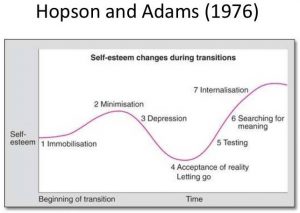Life Transitions Counselling & Coping with Changed Circumstances
Life doesn’t stay still, even if we want it too … Even if we feel we have stayed the same, we can’t stop change in the world around us. Change can be exciting but it can also be unsettling. Life Transition counselling helps you approach both planned and unexpected altered circumstances with a positive attitude.
What is life transition?
There are events that happen in our lives that instigate change. However not every event will trigger the process that can be seen as a life transition.
Some events will have a different impact on individuals, depending on their life situation. For one person it will be a matter of acknowledging the reality, for another it may have an impact of earthquake magnitude:
- Finding out that one can’t have children may be differently received by a celibate nun to newly married girl dreaming of a big family.
- The need to move from one country to another may have different impact on someone who is single and works independently, to someone who has a young family and not many employment options.
In our understanding, transition is a process triggered by a significant event, which
“results in changed relationships, routines, assumptions and roles” (Schlossberg et.al 1995).
“Transitions actually begin with an ending: we have to let go of the old thing before we pick up the new” (Bridges 1980).
A Transition can be set in motion either by something that has happened, e.g. Redundancy, or something that we anticipated would happen, and consequently did not, e.g. Having a baby.
Either situation requires us to revisit and modify assumptions that we made about the world or ourselves, assumptions which are often taken for granted.
What can start a life transition?
Events that would typically set in motion a transition process:
Death of a close family member/friend
Divorce, separation or breakup
Being a victim of abuse (rape, bullying)
Loss of a job or redundancy
Pregnancy – planned & unexpected
Becoming a parent for the first time
Learning you’re unable to conceive
Finance shocks: lotto win, loss of savings?
Getting a promotion & taking a new role
Retirement & feeling at sea – what now?
Injury or illness that changes your life
The Menopause & what it means
Leaving home or a move back
Coming out as bi, gay or trans
Gender transition & the ‘Journey’
How to cope with a life transition
How we cope with particular transitions, and how long it takes, depends on an individual and the particular circumstances. Similarly, one person can cope well with one transition but struggle with another, e.g. a mother coping very well with her children leaving home, but struggling with menopause and accepting the loss of aspects of her feminine physicality.
Sometimes we do not come to terms with a transition no matter how much time had passed. Queen Victoria never came to terms with loss of her husband. She kept his room and belongings untouched for years.
Regardless of individual differences, the transition cycle has a similar pattern for all of us, with specific feelings, emotions and appropriate strategies respectively.
Progress through that pattern is rarely a continuous improvement, it is more like two steps forward one step back, and we may be working through more than one transition at the same time.
Understanding where you are in your life transitions can help to normalise how you feel, gain hope for the future and encourage you to seek help if necessary.
It may be the case that you are experiencing feelings of anxiety, depression, and hopelessness, low self –esteem , self doubt (links) – connecting those emotions or feelings, with your place on the transition curve may help in the therapy you are receiving for those issues.
Death of a close family member/friend

Divorce/separation or relationship breakup

Being a victim of abuse, rape, bullying

Loss of a job, redundancy

Getting pregnant

Becoming a parent

Not being able to have a baby

Menopause

Injury or illness

Winning a lottery etc.

Being promoted

Leaving home

Retirement & feeling at sea
Gender Transition

Coming out as gay, bi, trans

Model Of Transition

How counselling can help to cope with life transitions
Whether you are aware of them or not, we all cope with transitions. When you say you can’t cope, what you mean is that:
- you don’t believe your coping strategy is effective: e.g. “I am still missing my child!”
Or
- that your coping style isn’t good enough: e.g. “I should be braver, or be crying less”
- perhaps you don’t know what strategies to employ, or the ones that you have employed have not worked
- maybe you feel that you don’t possess the skills or resources you believe would help
However, we do all have a range of responses and strategies that we employ during a transition experience, and the fact that you are reading this proves that you can cope.
Those skills and strategies can be developed.
If reading this page you identified yourself as being at one of the stages of life transition, and you are worried that you are ‘not coping’ – you may need some help with exploring what areas to search for new resources. The questions to ask would be:
1. Have you experienced a similar event before?
What were your resources and coping strategies then? Did they work? What is similar / different?You and your family are moving to another country. Perhaps you moved countries before, as a child, following your parents’ choice. Some elements of that transition will be relevant: culture assimilation, ability to make friends. The difference now might be that you are now a parent responsible for your child’s transition as well as your own.
2. Is this transition your choice or forced by circumstances?
Your journey through the transition stages will vary depending on how much agency/control you feel you possess. So, the transition you instigated – e.g. moving countries, feels different to one that you have to endure – serious illness, being ‘dumped’ by a partner.
3. What else is happening in your life that may support or jeopardise your movement through transition?
It is a common occurrence that once we go through one major event we may ignore the impact of other parts of life. For example, whilst moving countries you had to suspend decisions regarding your aging parents’ health and care, however you are still worrying about them.
4. What help is available? Are you aware when and how to ask for it?
Understanding your place on the transition journey may help you to identify what kind of help would be appropriate. In the stage of ‘self-doubt’ you may need a lot of space to talk and be heard rather than practical advice, as opposed to the stage of ‘testing new behaviours’, where you are ready to hear suggestions and take risks.
5. What do you know about ‘yourself in crisis’?
What have you learned about your ghosts and demons?
Character is what you are in the dark. Dwight L. Moody.
It is important to be aware not only of our strengths but also of who we become under pressure. Unfortunately, that cannot be foreseen until it happens. All we have is hope that we will live up to our standards, and sometimes we surprise ourselves by surpassing those hopes.
Sometimes ‘Living up to our standards’ doesn’t become reality.
E.g. you wanted to be a pillar of strength for you wife and children in a new country, but instead you are ridden by fear and doubt and take it out on them.
Very often this response can cause a sense of disappointment and depression and doesn’t help get through the transition.
What helps is accepting ‘who we are’ and employing this knowledge to obtain the best outcome. So, for example if you have been diagnosed with a health condition, you come to terms with your condition and seek support for yourself, and leave supporting your family to others. Courage is to accept that we are not as great as we thought and plough on regardless, taking our ghosts and shadows with us.

